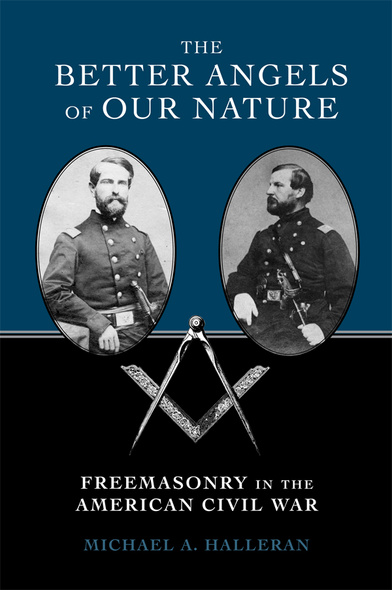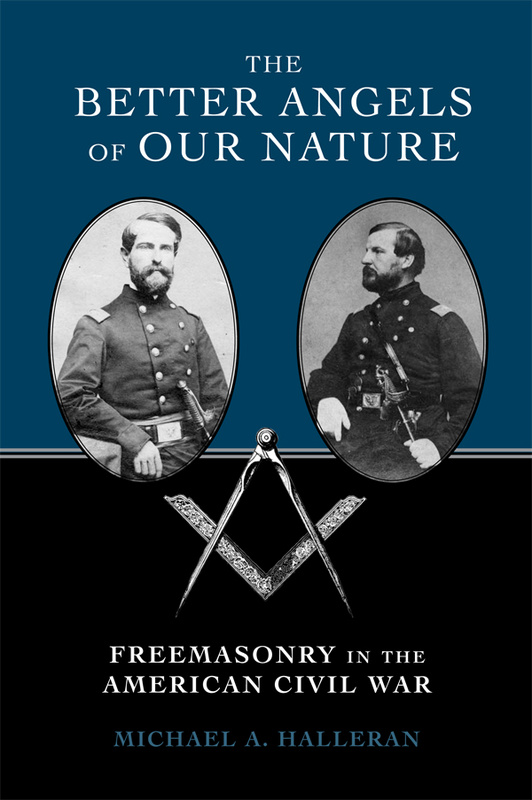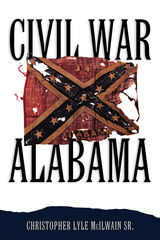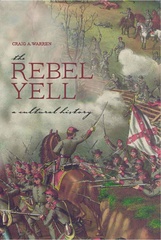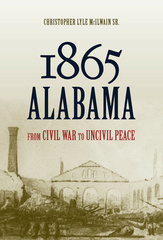The Better Angels of Our Nature
Freemasonry in the American Civil War
The first in-depth study of the Freemasons during the Civil War
One of the enduring yet little examined themes in Civil War lore is the widespread belief that on the field of battle and afterward, members of Masonic lodges would give aid and comfort to wounded or captured enemy Masons, often at great personal sacrifice and danger. This work is a deeply researched examination of the recorded, practical effects of Freemasonry among Civil War participants on both sides.
From first-person accounts culled from regimental histories, diaries, and letters, Michael A. Halleran has constructed an overview of 19th-century American freemasonry in general and Masonry in the armies of both North and South in particular, and provided telling examples of how Masonic brotherhood worked in practice. Halleran details the response of the fraternity to the crisis of secession and war, and examines acts of assistance to enemies on the battlefield and in POW camps.
The author examines carefully the major Masonic stories from the Civil War, in particular the myth that Confederate Lewis A. Armistead made the Masonic sign of distress as he lay dying at the high-water mark of Pickett’s charge at Gettysburg.
The Better Angels of Our Nature accomplishes what few books about Freemasons are able to do: it explores the legends and long-told tall tales of the fraternity in an academic fashion, with both dispassionate analysis of the facts, and an obvious passion for the subject. Personal accounts from the Civil War have the effect of personalizing the experience, instead of being able to hold it at a polite distance, perhaps because it was the first war that had, not just commanders, but so many enlisted men educated enough to write letters and diaries. Along the way, Michael shatters several longstanding and cherished Masonic fables, but he reinforces and illuminates far more than he buries. The result is a strong affirmation of the bond between warring Masonic brethren, in the war that brought more of them together on opposing sides than any in our history.’
—Christopher L. Hodapp, Editor, Journal of the Masonic Society
‘Michael Halleran has set a new, high standard for scholarship on Freemasonry in the Civil War. His stories are compelling, the research is impeccable, and his analysis gives fresh insights on the ‘mystic tie’ of the fraternity.’
—S. Brent Morris, Ph.D., Managing Editor, Scottish Rite Journal
‘Through impressive documentation, Halleran proves Masonic membership (which was high on both sides) frequently altered individuals' actions dramatically within their own army and in their treatment of the enemy. A valuable contribution to both Civil War history and the history of the Masonic lodge. Recommended’
—CHOICE
‘Tales of Masonic brothers helping each other, even across battle lines, have long been part of Civil War lore. Michael Halleran’s wonderful study reveals the history behind these mythical stories. He discovers a surprising number of these accounts, subjects them to careful analysis, and shows how much Masonic fraternity made a difference in the experiences of Civil War soldiers.’
—Steven C. Bullock, Ph.D., Worcester Polytechnic Institute
The Better Angels of Our Nature accomplishes what few books about Freemasons are able to do: it explores the legends and long-told tall tales of the fraternity in an academic fashion, with both dispassionate analysis of the facts, and an obvious passion for the subject. Personal accounts from the Civil War have the effect of personalizing the experience, instead of being able to hold it at a polite distance, perhaps because it was the first war that had, not just commanders, but so many enlisted men educated enough to write letters and diaries. Along the way, Michael shatters several longstanding and cherished Masonic fables, but he reinforces and illuminates far more than he buries. The result is a strong affirmation of the bond between warring Masonic brethren, in the war that brought more of them together on opposing sides than any in our history.’
—Christopher L. Hodapp, Editor, Journal of the Masonic Society
‘Michael Halleran has set a new, high standard for scholarship on Freemasonry in the Civil War. His stories are compelling, the research is impeccable, and his analysis gives fresh insights on the ‘mystic tie’ of the fraternity.’
—S. Brent Morris, Ph.D., Managing Editor, Scottish Rite Journal
‘Through impressive documentation, Halleran proves Masonic membership (which was high on both sides) frequently altered individuals' actions dramatically within their own army and in their treatment of the enemy. A valuable contribution to both Civil War history and the history of the Masonic lodge. Recommended’
—CHOICE
‘Tales of Masonic brothers helping each other, even across battle lines, have long been part of Civil War lore. Michael Halleran’s wonderful study reveals the history behind these mythical stories. He discovers a surprising number of these accounts, subjects them to careful analysis, and shows how much Masonic fraternity made a difference in the experiences of Civil War soldiers.’
—Steven C. Bullock, Ph.D., Worcester Polytechnic Institute
'A century and a half after the Civil War's conclusion, it hardly seems posible that fresh nooks for historical research could possibly remain. With his engrossing book The Better Angels of Our Nature: Freemasonry in the American Civil War, author Michael Halleran proves that even the war's niches can still be explored for yet another valuable chapter in our national history. . . . Patriotic, kind-hearted men who embraced the Masonic brotherhood deserve exactly what Halleran delivers: clear-headed, well-sourced narrative of American Freemasonry in one of the country's darkest hours.' —Chris Lazzarino, Kansas Alumni Magazine'Not much has been written on this topic, which makes Halleran's book the beginning of a new trail. It is recommended to Freemasons, and to those interested in the Civil War and what influence Freemasons had.'
—Blue Gray Magazine
'A century and a half after the Civil War's conclusion, it hardly seems posible that fresh nooks for historical research could possibly remain. With his engrossing book The Better Angels of Our Nature: Freemasonry in the American Civil War, author Michael Halleran proves that even the war's niches can still be explored for yet another valuable chapter in our national history. . . . Patriotic, kind-hearted men who embraced the Masonic brotherhood deserve exactly what Halleran delivers: clear-headed, well-sourced narrative of American Freemasonry in one of the country's darkest hours.' —Chris Lazzarino, Kansas Alumni Magazine'Not much has been written on this topic, which makes Halleran's book the beginning of a new trail. It is recommended to Freemasons, and to those interested in the Civil War and what influence Freemasons had.'
—Blue Gray Magazine
The book’s topic is well deserving of close study. Halleran contributes to the ongoing study of freemasonry and fraternalism as an overlooked yet significant part of nineteenth-century American life and culture.’
—Journal of Southern History
‘Given the freshness of the topic, the good research, and the effective presentation, I strongly recommend this book. It covers a significant but un-studied aspect of the war.’
—Earl J. Hess, author of The Rifle Musket in Civil War Combat: Reality and Myth and In the Trenches at Petersburg: Field Fortifications and Confederate Defeat
The book’s topic is well deserving of close study. Halleran contributes to the ongoing study of freemasonry and fraternalism as an overlooked yet significant part of nineteenth-century American life and culture.’
—Journal of Southern History
‘Given the freshness of the topic, the good research, and the effective presentation, I strongly recommend this book. It covers a significant but un-studied aspect of the war.’
—Earl J. Hess, author of The Rifle Musket in Civil War Combat: Reality and Myth and In the Trenches at Petersburg: Field Fortifications and Confederate Defeat
Preface
Acknowledgments
Introduction
Prologue
1. Masters and Fellows
2. Plures Ex Uno
3. “If That Is Masonry I Will Take Some of It Myself”
4. Saving the Life of the Enemy
5. Gentlemen of the White Apron
6. A More Decent Interment
7. All Passions Laid Aside?: Free masonry in the Army
Afterword
Notes
Glossary of Masonic Terms
Bibliography
Index

